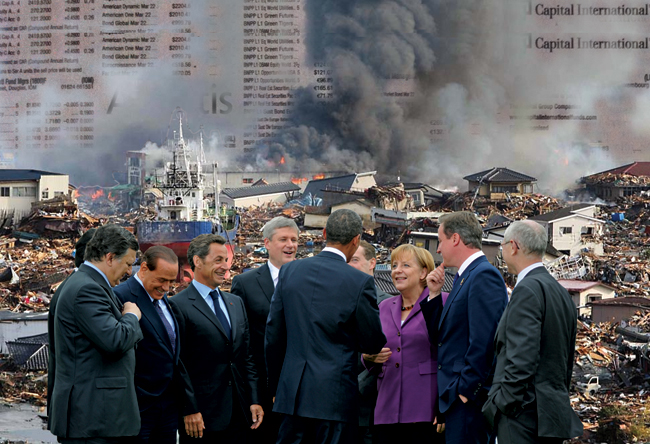Why protest against G8/G20?
Why travel to other countries to protest at international summits of world leaders? The anti capitalist movement was famed for ‘summit hopping’ and it’s massive international mobilisations against the G8, the WTO, the World Bank and the IMF.
Globalise Resistance is once more aiming to get people along to a couple of protests in France this year: the G8 and the G20. Here’s why…
The G8 & G20 summits are being held in France this year. Since 1975, the G8 (well it was G7 in those days) has met to decide the priorities of the governments of the 8 richest countries in the world. No accountability, no democracy, no transparency, simply a caucus of the richest nations ensuring they remain the richest.
Since the summit in Birmingham in 1998, the summit has been the target of protesters demanding a fairer hearing for those less well off in the world. In ‘98, debt campaigners surrounded the summit calling for developing world debt to be cancelled. In 2001 300,000 protesters in Genoa saw the anti-capitalist movement in force confronting the G8, in 2003 in Evian and Geneva, hundreds of thousands opposed the summit calling it “Illegitimate” and in 2005 the Make Poverty History movement pleaded for concessions for Africa.
The G20 was formed 12 years ago and is now, with the growth in economic power and importance of many of its constituent members (Brazil, India, South Korea and China most notably) usurping the prominence of the G8. The original smaller group is rapidly turning into a meeting of the old powers trying to find a way of preserving its influence.
Do not be fooled, the G20 is no step forward or opening up of democracy. The G20’s members are the finance ministers and governors of the Central Banks of the member countries. These powers will continue to impose neo-liberal policies and laws, will be working in the interests of those who fund government election campaigns and suppose to create jobs and investment. There is just one African country represented at the G20, Europe has four seats and an extra one for the EU as a whole. Privatisation, war and corporate power will maintain primacy in the decisions and policies emanating from these summits.
It is hugely encouraging to see resistance around the world to the ravages of capital. From the union protests in Wisconsin, USA, to the revolutions and the brave resistance in North Africa and the Middle East to the strikes and protests sweeping Europe.
The policies of neoliberalism recognize no borders, and our resistance must be international. More than that, when activists and dissenters come together from around the world, there is both a fantastic feeling of solidarity, but also an intense learning experience. Most protests against such summits are accompanied by counter summits, rich in theory and ideas for action.
Globalise Resistance has a long record of enabling people to participate in these international mobilisations and will be doing so again this year. On 26 / 27 March, the French movement will be hosting an international planning meeting, and while people are up to all the shenanigans in London, we’ll have people in Paris planning the next stage.
There will be a report from this meeting at the Globalise Resistance Forum in London on 5 April. Come along and find out more about the plans that have been made.
-
- The G7 was composed of: USA, Canada, UK, France, Germany, Italy, Japan with Russia making it 8.
- The G20 member states are: Argentina, Australia, Brazil, Canada, China, France, Germany, India, Indonesia, Italy, Japan, Mexico, Russia, Saudi Arabia, South Africa, Republic of Korea, Turkey, United Kingdom, United States of America with the EU completing the 20.
- For reports of the G8 protests in Genoa (2001), Evian / Geneva (2003), Gleneagles / Edinburgh (20005) and Heiligendam / Rostock (2007) see reports elsewhere on this website.








